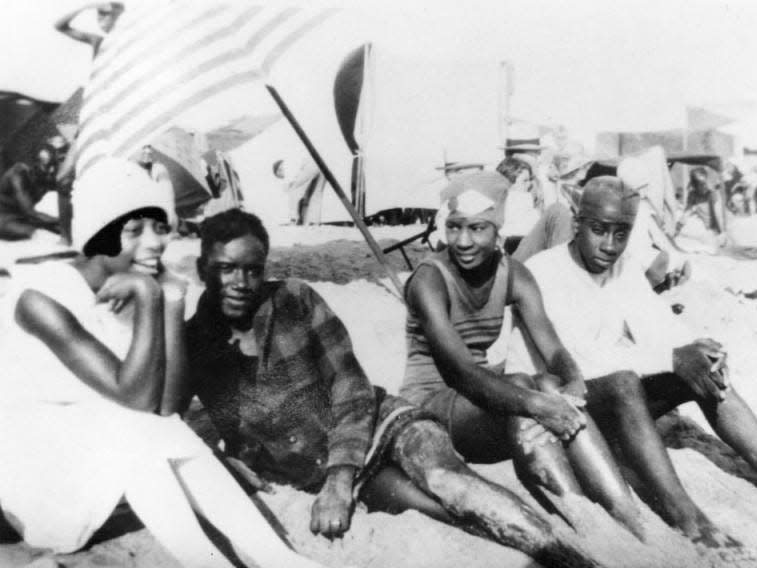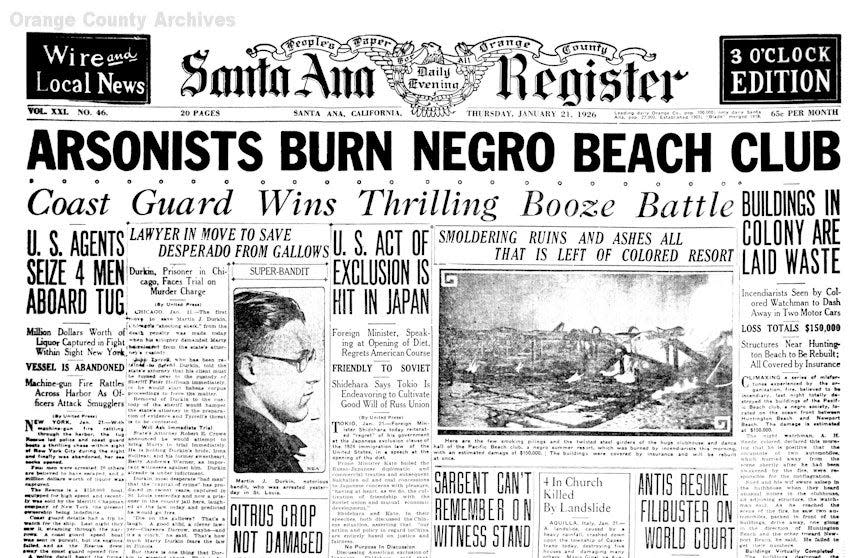In 1926, an all-Black beach club was set to open on Huntington Beach. Then, it mysteriously burned down.

The Pacific Beach Club was meant to be a safe haven for Black beachgoers during the Jim Crow era.
It faced fierce opposition from white society, and mysteriously burned down in 1926.
Recent reparations advocacy is looking to right the wrongs of the past.
It was going to be the resort of the century for Orange County's Black beachgoers.
In the early 1920s, Black residents in Southern California were abuzz with the hopes that they'd finally have a place to enjoy the beach. Jim Crow-era segregation kept Black communities out of all-white beaches, pools, and other recreational spots.
Instead, they were limited to a Santa Monica beach that white residents denigrated as the "Inkwell" — a derogatory name the Black community adopted as a badge of pride — and Bruce's Beach, a Black resort on Manhattan Beach that the city took from its owners in 1924. Though intended to be safe havens, both were still spaces of pollution and harassment, where some white residents assaulted Black beachgoers and slashed their tires.
The Pacific Beach Club would be something different. The membership-only resort on Huntington Beach, just a short drive from the city, would have a 2,000-person bathhouse, a clubhouse with "an atmosphere of ease and sociality," more than 200 tent houses, and an amusement zone with "all the concessions you will find on any beach," according to advertisements.
The club was the dream child of a coalition of Black business leaders led by E. Burton Ceruti, co-founder of the Los Angeles chapter of the NAACP. Ceruti, a prominent attorney, had led a drive to expel D.W. Griffith's 1915 film "The Birth of a Nation" and successfully opened up the county's nurse training program to Black women in 1918.
Now, Ceruti was set on opening a beach resort that would be "a place of our own" — something that had "previously been denied" to California's Black community, according to the California Eagle, Los Angeles' leading Black newspaper.

The Pacific Beach Club faced fierce opposition from white society
On Labor Day 1925, nearly 10,000 Black spectators gathered in Huntington Beach for a beauty pageant, which was partly a promotional event for the beach club's opening. Ceruti announced that the grand opening was set for Abraham Lincoln's birthday on February 12, 1926.
But the club faced staunch opposition from white society. Residents openly harassed workers, and the city of Huntington Beach refused to extend gas or electricity lines to the resort. The Pacific Electric and Southern Pacific rail lines also refused access to their tracks, severely limiting public access, until Ceruti successfully appealed to the state.
Then, at dawn on January 21 — just a few weeks before the grand opening — the Pacific Beach Club burned down.
Around 6 a.m., a security guard spotted flames and two runaway cars. The guard told the Los Angeles Times that he got a good look at one man, "who was white."
Ceruti and fellow organizers tried to bounce back with a fundraising campaign, but the white community at Huntington Beach mobilized, too, with a new organization "to oppose any further efforts of negroes to establish a colony on the ocean front," according to the L.A. Times.

Finding hope and justice in land restoration
The Pacific Beach Club was never rebuilt, which historians and reparations activists have cited as just another example of Black aspirations snuffed out by white fear and racism.
Today, Orange County remains the only metropolitan area in the US where Black residents make up less than 5% of the total population.
But activists also find hope in recent developments in land restoration. In September 2021, the descendants of Charles and Willa Bruce, who had built the Bruce's Beach resort, won back the land that had been taken from them a century ago after California passed a law authorizing its return.
"A century ago the Bruce's had their land stolen. Now there is nothing holding back the county from doing the right thing," Senator Steven Bradford said in a statement.
The Bruce's Beach case has become a beacon of hope for social justice leaders who are fighting to help other Black families whose ancestors fell victim to land theft in America.
Read the original article on Insider

 money
money 